在复合句中用作宾语的从句叫宾语从句
- 格式:doc
- 大小:71.50 KB
- 文档页数:22
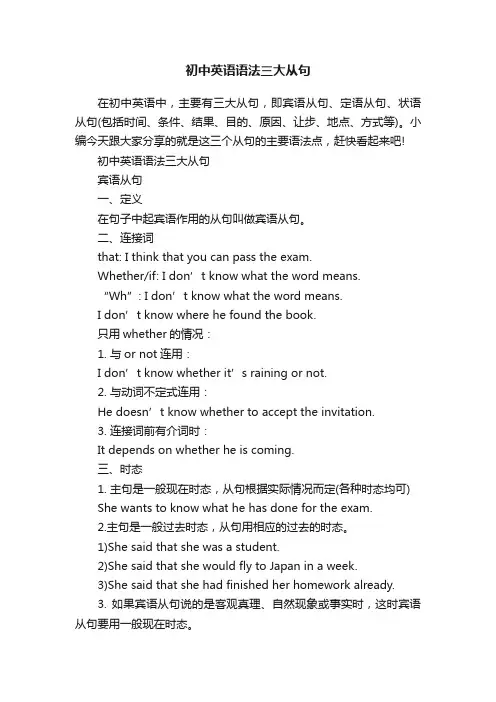
初中英语语法三大从句在初中英语中,主要有三大从句,即宾语从句、定语从句、状语从句(包括时间、条件、结果、目的、原因、让步、地点、方式等)。
小编今天跟大家分享的就是这三个从句的主要语法点,赶快看起来吧!初中英语语法三大从句宾语从句一、定义在句子中起宾语作用的从句叫做宾语从句。
二、连接词that: I think that you can pass the exam.Whether/if: I don’t know what the word means.“Wh”: I don’t know what the word means.I don’t know where he found the book.只用whether的情况:1. 与or not连用:I don’t know whether it’s raining or not.2. 与动词不定式连用:He doesn’t know whether to accept the invit ation.3. 连接词前有介词时:It depends on whether he is coming.三、时态1. 主句是一般现在时态,从句根据实际情况而定(各种时态均可)She wants to know what he has done for the exam.2.主句是一般过去时态,从句用相应的过去的时态。
1)She said that she was a student.2)She said that she would fly to Japan in a week.3)She said that she had finished her homework already.3. 如果宾语从句说的是客观真理、自然现象或事实时,这时宾语从句要用一般现在时态。
The teacher said that the earth goes round the sun.定语从句一、定义在复合句中修饰名词、代词的从句叫定语从句。
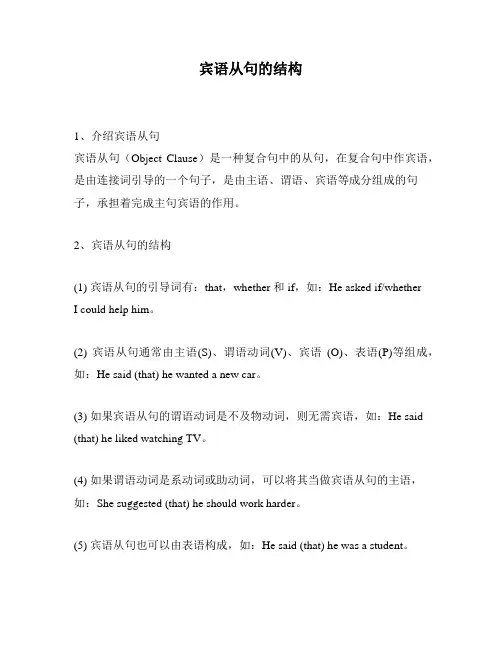
宾语从句的结构1、介绍宾语从句宾语从句(Object Clause)是一种复合句中的从句,在复合句中作宾语,是由连接词引导的一个句子,是由主语、谓语、宾语等成分组成的句子,承担着完成主句宾语的作用。
2、宾语从句的结构(1) 宾语从句的引导词有:that,whether 和 if,如:He asked if/whetherI could help him。
(2) 宾语从句通常由主语(S)、谓语动词(V)、宾语(O)、表语(P)等组成,如:He said (that) he wanted a new car。
(3) 如果宾语从句的谓语动词是不及物动词,则无需宾语,如:He said (that) he liked watching TV。
(4) 如果谓语动词是系动词或助动词,可以将其当做宾语从句的主语,如:She suggested (that) he should work harder。
(5) 宾语从句也可以由表语构成,如:He said (that) he was a student。
3、宾语从句的句型(1) 简单句及主谓结构:They said (that) they were ready. 他们说他们准备好了。
(2) 由否定词引导的宾语从句:They say (that) he isn’t satisfied with his job. 他们说他对他的工作不满意。
(3) 宾语从句中出现疑问词(what, when, where, why, who, whose, which):He asked me what I wanted. 他问我要什么。
(4) 由从属连词(when, while, before, after, as, since, until, if, unless, whether, though)引导的宾语从句:He wondered whether he should go. 他想知道他是否应该去。
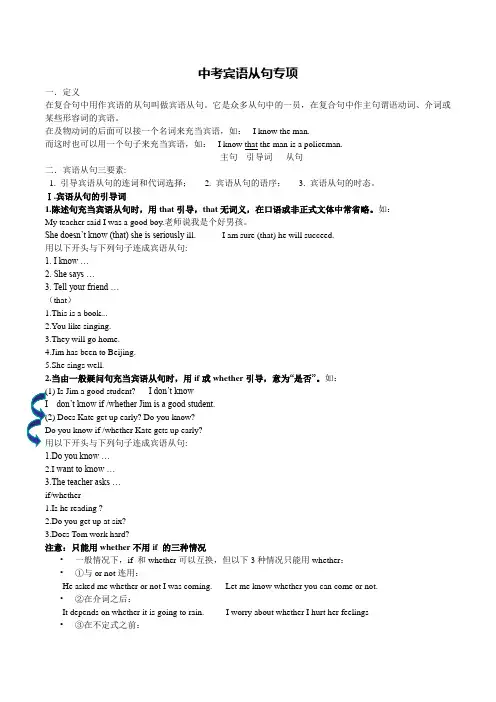
中考宾语从句专项一.定义在复合句中用作宾语的从句叫做宾语从句。
它是众多从句中的一员,在复合句中作主句谓语动词、介词或某些形容词的宾语。
在及物动词的后面可以接一个名词来充当宾语,如:I know the man.而这时也可以用一个句子来充当宾语,如:I know that the man is a policeman.主句引导词从句二.宾语从句三要素:1. 引导宾语从句的连词和代词选择;2. 宾语从句的语序;3. 宾语从句的时态。
Ⅰ.宾语从句的引导词1.陈述句充当宾语从句时,用that引导,that无词义,在口语或非正式文体中常省略。
如:My teacher said I was a good boy.老师说我是个好男孩。
She doesn’t know (that) she is seriously ill. I am sure (that) he will succeed.用以下开头与下列句子连成宾语从句:1. I know …2. She says …3. Tell your friend …(that)1.This is a book...2.You like singing.3.They will go home.4.Jim has been to Beijing.5.She sings well.2.当由一般疑问句充当宾语从句时,用if或whether引导,意为“是否”。
如:(1) Is Jim a good student? I don’t knowI don’t know if /whether Jim is a good student.(2) Does Kate get up early? Do you know?Do you know if /whether Kate gets up early?用以下开头与下列句子连成宾语从句:1.Do you know …2.I want to know …3.The teacher asks …if/whether1.Is he reading ?2.Do you get up at six?3.Does Tom work hard?注意:只能用whether不用if 的三种情况•一般情况下,if 和whether可以互换,但以下3种情况只能用whether:•①与or not连用:He asked me whether or not I was coming. Let me know whether you can come or not.•②在介词之后:It depends on whether it is going to rain. I worry about whether I hurt her feelings•③在不定式之前:We haven’t decided whether to go there. I don’t know whether to accept or refuse.3.如果宾语从句原来是特殊疑问句,只需用原来的疑问词引导。
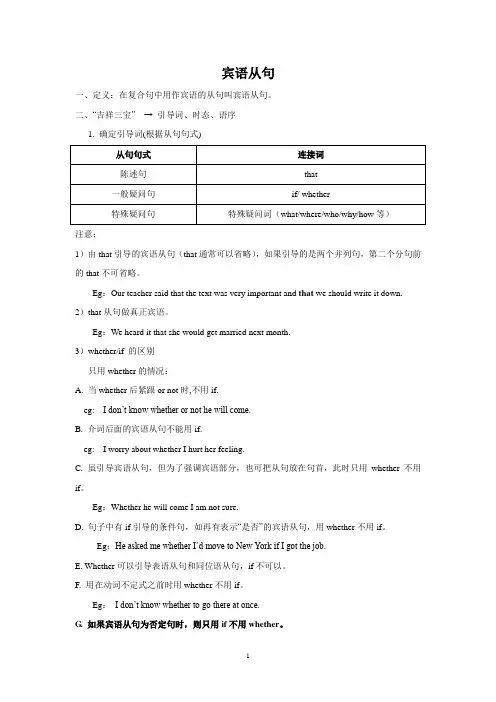
宾语从句一、定义:在复合句中用作宾语的从句叫宾语从句。
二、“吉祥三宝” → 引导词、时态、语序1. 确定引导词(根据从句句式)从句句式连接词陈述句that一般疑问句if/ whether特殊疑问句特殊疑问词(what/where/who/why/how等)注意:1)由that引导的宾语从句(that通常可以省略),如果引导的是两个并列句,第二个分句前的that不可省略。
Eg:Our teacher said that the text was very important and that we should write it down.2)that从句做真正宾语。
Eg:We heard it that she would get married next month.3)whether/if 的区别只用whether的情况:A. 当whether后紧跟or not时,不用if.eg: I don’t know whether or not he will come.B. 介词后面的宾语从句不能用if.eg: I worry about whether I hurt her feeling.C. 虽引导宾语从句,但为了强调宾语部分,也可把从句放在句首,此时只用whether不用if。
Eg:Whether he will come I am not sure.D. 句子中有if引导的条件句,如再有表示“是否”的宾语从句,用whether不用if。
Eg:He asked me whether I’d move to New Y ork if I got the job.E. Whether可以引导表语从句和同位语从句,if不可以。
F. 用在动词不定式之前时用whether不用if。
Eg:I don’t know whether to go there at once.G. 如果宾语从句为否定句时,则只用if不用whether。
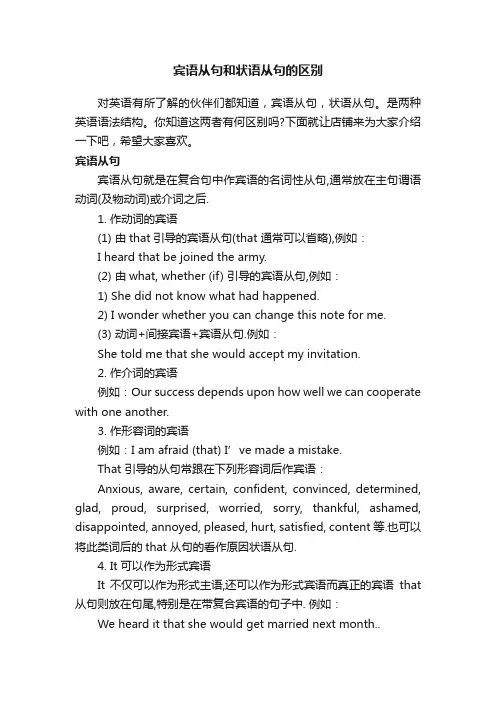
宾语从句和状语从句的区别对英语有所了解的伙伴们都知道,宾语从句,状语从句。
是两种英语语法结构。
你知道这两者有何区别吗?下面就让店铺来为大家介绍一下吧,希望大家喜欢。
宾语从句宾语从句就是在复合句中作宾语的名词性从句,通常放在主句谓语动词(及物动词)或介词之后.1. 作动词的宾语(1) 由that引导的宾语从句(that 通常可以省略),例如:I heard that be joined the army.(2) 由what, whether (if) 引导的宾语从句,例如:1) She did not know what had happened.2) I wonder whether you can change this note for me.(3) 动词+间接宾语+宾语从句.例如:She told me that she would accept my invitation.2. 作介词的宾语例如:Our success depends upon how well we can cooperate with one another.3. 作形容词的宾语例如:I am afraid (that) I’ve made a mistake.That 引导的从句常跟在下列形容词后作宾语:Anxious, aware, certain, confident, convinced, determined, glad, proud, surprised, worried, sorry, thankful, ashamed, disappointed, annoyed, pleased, hurt, satisfied, content 等.也可以将此类词后的that 从句的看作原因状语从句.4. It 可以作为形式宾语It 不仅可以作为形式主语,还可以作为形式宾语而真正的宾语that 从句则放在句尾,特别是在带复合宾语的句子中. 例如:We heard it that she would get married next month..5. 后边不能直接跟that 从句的动词这类动词有Allow, refuse, let, like, cause, force, admire, condemn, celebrate, dislike, love, help, take, forgive等.这类词后可以用不定式或动名词作宾语,但不可以用that引导的宾语从句.例如:I admire their winning the match. (right)I admire that they won the match. (wrong)6. 不可用that从句作直接宾语的动词有些动词不可用于“动词+间接宾语+that从句“结构中,常见的有Envy, order, accuse, refuse, impress, forgive, blame, denounce, advise, congratulate等.例如:He impressed the manager as an honest man. (right)He impressed the manager that he was an honest man. (wrong)7. 否定的转移若主句谓语动词为Think, consider, wuppose, believe, expect, fancy, guess, imagine等,其后的宾语从句若含有否定意义,一般要把否定词转移到主句谓语上,从句谓语用肯定式.例如:I don’t think this dress fits you well.(我认为这件衣服不适合你穿.)状语从句(Adverbial Clause)一状语从句的种类§ 1状语从句的种类用来修饰谓语动词、其它动词、定语、状语或整个句子的从句叫做状语从句.状语从句可分为:1.时间状语从句;(adverbial clause of time)2.地点状语从句;(adverbial clause of place)3.原因状语从句;(adverbial clause of cause)4.条件状语从句;(adverbial clause of condition)5.目的状语从句;(adverbial clause of purpose)6.让步状语从句;(adverbial clause of concession)7.比较状语从句;(adverbial clause of comparison)8.程度状语从句;(adverbial clause of degree)9.方式状语从句;(adverbial clause of manner)10.结果状语从句.(adverbial clause of result)§2状语从句的时态特点一般情况下,时间和条件状语从句的谓语动词一般用“一般现在时”表示“一般将来时”,用“现在完成时”表示“将来完成时”.例如:I will call you as soon as I arrive in Beijing. 我一到北京就给你打电话.(这是由as soon as引导的时间状语从句,从句中的谓语动词arrive是一般现在时,表示一般将来时,决不可用will arrive)As soon as I have finished this work, I will go home. 我一完成此工作,就回家.(从句中的谓语动词用现在完成时have finished,表示将来完成时,决不可用will have finished)If he comes back, please let me know.如果他回来了,请通知我.(从句中的谓语动词用comes back,表示一般将来时,决不可用will come back)二时间状语从句§3时间状语从句(adverbial clause of time)1.由when, while, as引导的时间状语从句.例如:When you think you know nothing, then you begin to know something.当你以为自己一无所知的时候,你就是在开始知道一些事物了.When truth is buried under the ground it grows, it chokes, it gathers such an explosive force that on the day it bursts out , it blows up everything with it.当真理被埋在地下的时候,它在生长,它感到压抑,它蓄存着这么一种爆炸性力量,一旦冒出,它就会炸破一切!Strike while the iron is hot. 趁热打铁.Will you watch my clothes while I have a swim. 我游泳的时候,请你照看一下我的衣服.You can feel the air moving as your hand pushes through it. 当你的手在空气中挥动的时候,你就能感觉到空气在流动.Our headmaster laughed as she spoke.我们的校长边谈边笑.【区别】when, while和as的区别:when引导的从句的谓语动词可以是延续性的动词,又可以是瞬时动词.并且when有时表示“就在那时”.例如:When she came in, I stopped eating.她进来时,我在吃饭.(瞬时动词)When I lived in the countryside, I used to carry some water for him.当的住在农村时,我常常为他担水.(延续性的动词)We were about to leave when he came in.我们就要离开,就在那时他进来了.While引导的从句的谓语动作必须是延续性的,并强调主句和从句的动作同时发生(或者相对应).并且while有时还可以表示对比.例如:While my wife was reading the newspaper, I was watching TV. (was reading是延续性的动词,was reading和was watching同时发生)I like playing football while you like playing basketball.我喜欢踢足球,而你喜欢打篮球.(对比)As表示“一边……一边”,as引导的动作是延续性的动作,一般用于主句和从句动作同时发生;as也可以强调“一先一后.例如:We always sing as we walk.我们总是边走边唱.(as表示“一边……一边”)As we was going out, it began to snow.当我们出门时,开始下雪了.(as强调句中两个动作紧接着先后发生,而不强调开始下雪的特定时间)2.由before和after引导的时间状语从句.注意before引导的从句不再用否定式的谓语,并且当before引导的从句位于主句之后,有时译成“就,才”.还要注意主句和从句之间的时间关系.当主句用将来时,从句总是用现在时;如果before引导的从句谓语用的是过去时,则主句动词多用过去完成时,这样以便体现动作发生的先后.After表示主句动作发生在从句动作之后.主句和从句的动作的时间关系正好与before引导的从句相反.例如:It will be four days before they come back. 他们要过四天才能回来.Einstein almost knocked me down before he saw me.爱因斯坦几乎把我撞倒才看到我.My father had left for Canada just before the letter arrived.我父亲恰好在信到之前去加拿大了.They had not been married four months before they were divorced. 他们结婚还不到四个月就离婚了.After you think it over, please let me know what you decide.你仔细考虑过以后,告诉我你是怎样决定的.After we had finished the work, we went home.完成工作之后,我们回家了.(从句用过去完成时,主句用一般过去时)3.由till或until引导的时间状语从句.till和until一般情况下两者可以互换,但是在强调句型中多用until.并且要注意的是:如果主句中的谓语动词是瞬时动词时,必须用否定形式;如果主句中的谓语动词是延续性动词时,用肯定或否定形式都可以,但表达的意思不同.例如:I didn't go to bed until(till) my father came back.直到我父亲回来我才上床睡觉.It was not until the meeting was over that he began to teach me English.直到散会之后他才开始教我英语.I worked until he came back.我工作到他回来为止.I didn't work until he came back.他回来我这才开始工作.Please wait until I arrived.在我到达之前请等我.4.由since引导的时间状语从句. since引导的从句的谓语动词可以是延续性的动词,又可以是瞬时动词.一般情况下,从句谓语动词用一般过去时,而主句的谓语动词用现在完成时.但在It is +时间+since从句的句型中,主句多用一般现在时.例如:I have been in Beijing since you left. 自从你离开以来,我一直在北京了.Where have you been since I last saw you? 自上次我和你见面以后,你到哪里去了?It is four years since my sister lived in Beijing. 我妹妹不在北京住有四年了.It is five months since our boss was in Beijing.我们老板离开北京有五个月了.5.由as soon as, immediately, directly, instantly, the moment, the instant, the minute, 等引导的时间状语从句.这些连词都表示“一……就”.例如:I will go there directly I have finished my breakfast. 吃完早饭,我立即到那里去.The moment I heard the news, I hastened to the spot.我一听到消息,马上赶到了出事地点.As soon as I reach Canada, I will ring you up. 我一到加拿大,就给你来电话.【注意】hardly(scarcely, rarely)…when / before, no sooner…than相当于as soon as之意.主句用过去完成时,从句用一般过去时.当hardly, scarcely, rarely和no sooner位于句首时,主句应用倒装语序.例如:He had no sooner arrived home than he was asked to start on another journey. 他刚到家,就被邀请开始另一旅程.No sooner had the sun shown itself above the horizon than he got out of bed to commence work.太阳刚从地平线上升起,他就起床劳动去了.Hardly had I sat down when he stepped in.我刚坐下,他就进来了.He had hardly fallen asleep when he felt a soft touch on his shoulder.这个阿拉伯人刚要入睡就感到肩膀上被轻轻一触.6.由by the time引导的时间状语从句.注意时态的变化:在一般情况下,如果从句的谓语动词用一般过去时,主句的谓语动词用过去完成时;如果主句的谓语动词用一般现在时,主句的谓语动词用将来完成时.例如:By the time you came back, I had finished this book.到你回来时,我已经写完这本书了.By the time you come here tomorrow, I will have finished this work. 你明天来这儿的时候,我将已经完成此工作了.7.由each time, every time和whenever引导的时间状语从句.例如:Each time he came to Harbin, he would call on me. 他每次来哈尔滨,总是来看我.Whenever that man says“To tell the truth”, I suspect that he's about to tell a lie.每当那个人说“说实在话”的时候,我猜想他就要说谎了.You grow younger every time I see you. 每次遇到你,见你更年轻了.8.由as long as和so long as引导的时间状语从句.这两个连词表示“有多久……就多久”.例如:You can go where you like as long as you get back before dark. 你可以随意到哪里去,只要在天黑以前回来就行.I will fight against these conditions as long as there is a breath in my body! 只要我一息尚存,我就要反对这种境况.三地点状语从句§4地点状语从句 (adverbial clause of place)地点状语从句一般由连接副词where, wherever等引导,已经形成了固定的句型,例如:句型1:Where+地点从句,(there)+主句.【注意】此句型通常译成“哪里……哪里就……”;主句在从句后面时,there可用可不用;如果主句在从句的前面时,一般都不用there.例如:Where there is no rain, farming is difficult or impossible.在没有雨水的地方,耕作是困难的,或根本不可能的.They were good persons. Where they went, there they were warmly welcomed. 他们都是好人.因此他们走到哪里都受到热烈欢迎.You should have put the book where you found it. 你本来应该把书放回原来的地方.Where the Communist Party of China goes, there the people are liberated.哪里有了中国共产党,哪里人民得解放.句型2:Anywhere/ wherever+地点从句,+主句.【注意】anywhere本身是个副词,但是,常可以引导从句,相当于连词,意思相似于wherever, anywhere引导的从句可位于主句之前,也可以位于主句之后. 而wherever本身就是个连词,表示“在何处,无论何处”.例如:Wherever the sea is , you will find seamen.有海就有海员.猜你喜欢。

英语宾语从句宾语从句(OBJECT CLAUSE)是名词性从句的一种。
在主从复合句中充当宾语,位于及物动词、介词或复合谓语之后的从句称为宾语从句。
宾语从句分为三类:动词的宾语从句,介词的宾语从句和形容词的宾语从句。
动词+宾语从句例如:Mum doesn't know if/whether he will go to Paris withher.妈妈不知道他是否要参加运动会。
注意:动词词组后面也可跟宾语从句。
例如:makesure确保makeup one's mind下决心keepin mind牢记2.介词+宾语从句例如:He is thinking about what he should bring with him.他正在考虑随身携带什么。
3.形容词+宾语从句例如:Mother is happy that he will go there with her.妈妈很高兴他愿意一起去那里。
这样的形容词有:sure,certain,glad,please,happy,sorry,afraid,satisfied,s urprised等。
基本构成宾语从句的三要素是:语序、连接词和时态。
语序:宾语从句用陈述语序(主谓语序)例如:I wonder when the train will come.我想知道火车什么时候到。
连接词有三种情况:1.that宾语从句为陈述句时,连接词常选择that,有时将that省略。
例如:Mothersays(that)she is ill.妈妈说她病了。
Mothersays(that)she'll be alright in couple of days.妈妈说她过两天就好了。
2.if或whether宾语从句由一般疑问句变来时,连接词常选择if或whether。
只用whether的情况:介词的宾语,whether…or not结构中不能用if替换。
例如:Motherdoesn't know if he can help her.妈妈不知道他是否能帮助她。
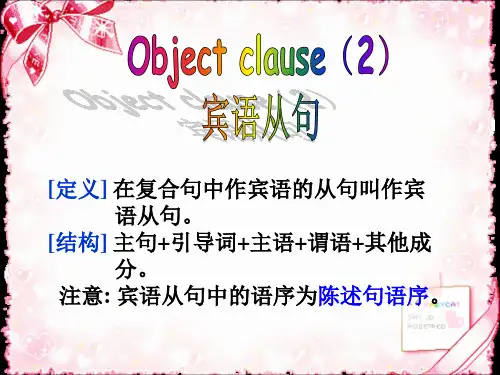
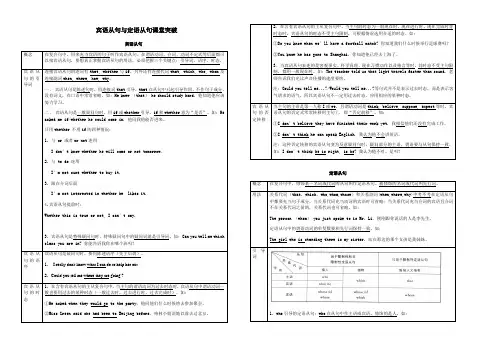
宾语从句与定语从句课堂突破宾语从句定语从句1. who引导的定语从句:who在从句中作主语或宾语,修饰的是人。
如:A.thatB. whereC. who2.On Monday April 15,2019,the fire____broke out in Notre Dame Cathedral in Paris shocked the world.(2019湘潭)A.thatB. whoC. where3.All the classmates enjoyed the cake____I made at the party.(2019郴州)A.thatB. who C what4.The man ___ is talking to my math teacher is my father.(2018邵阳)A.WhoB. which C what5.-- Tomorrow is Father’s Day. What’s your surprise for your father?--The first thing ____I will do is to make a card for him.(2019黄冈)A.whoB. whereC. whoseD. that6,---Could you please tell me ______ mooncakes traditionally in China,Li Hua?--During the Mid-autumn Festival.(2019邵阳)A.When people ateB. when people eatC. when do people eat7, ---Hi, Shirly. Could you tell me____?(2019湘西)---At 11:30 tomorrow morning.A.When will you arriveB. when you will arriveC. where you will arrive8.----Your sweater looks nice. Could you tell me_____?----Of course. Just at the shop near my school.(2019怀化)C.where do you buy it B. where did you buy it C. where you bought it9.---Could you tell me ______?---I am not sure, maybe tomorrow(2018益阳)A.When does he leave for ChangshaB.When he is leaving for ChangshaC.When is he leaving for Changsha10.----Did you notice ____in her office?-----Yes. She was going over our writing.(2019北京)A, what was Miss Lin doing B,what Miss Lin was doingC, what does Miss Lin do D,what Miss Lin do11.------Could you please tell me ________for the fruit?------By paying over the Internet.(2019天津)A, how much I will pay B, how much will i payC, how will I pay D,how I will pay12. Rose is wondering _________.(2019武汉)A, what is Matt doing B, where has Jason goneC, when will Matt leave D,who did the washing13.----Could you please tell me______?(2019南通)----With pleasure. Wait a moment,please.A, if the scarf looked nice on me B, what’s the new product likeC, that Guilin is worth visiting D, how I can order a robot online。
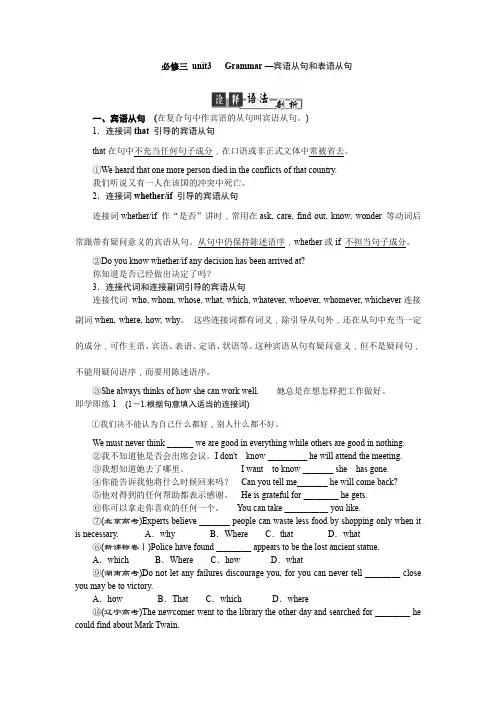
必修三unit3 Grammar —宾语从句和表语从句一、宾语从句(在复合句中作宾语的从句叫宾语从句。
)1.连接词that 引导的宾语从句that在句中不充当任何句子成分,在口语或非正式文体中常被省去。
①We heard that one more person died in the conflicts of that country.我们听说又有一人在该国的冲突中死亡。
2.连接词whether/if 引导的宾语从句连接词whether/if 作“是否”讲时,常用在ask, care, find out, know, wonder 等动词后常跟带有疑问意义的宾语从句。
从句中仍保持陈述语序,whether或if 不担当句子成分。
②Do you know whether/if any decision has been arrived at?你知道是否已经做出决定了吗?3.连接代词和连接副词引导的宾语从句连接代词who, whom, whose, what, which, whatever, whoever, whomever, whichever连接副词when, where, how, why。
这些连接词都有词义,除引导从句外,还在从句中充当一定的成分,可作主语、宾语、表语、定语、状语等。
这种宾语从句有疑问意义,但不是疑问句,不能用疑问语序,而要用陈述语序。
③She always thinks of how she can work well. 她总是在想怎样把工作做好。
即学即练1 (1-1.根据句意填入适当的连接词)①我们决不能认为自己什么都好,别人什么都不好。
We must never think ______ we are good in everything while others are good in nothing.②我不知道他是否会出席会议。
I don't know _________ he will attend the meeting.③我想知道她去了哪里。
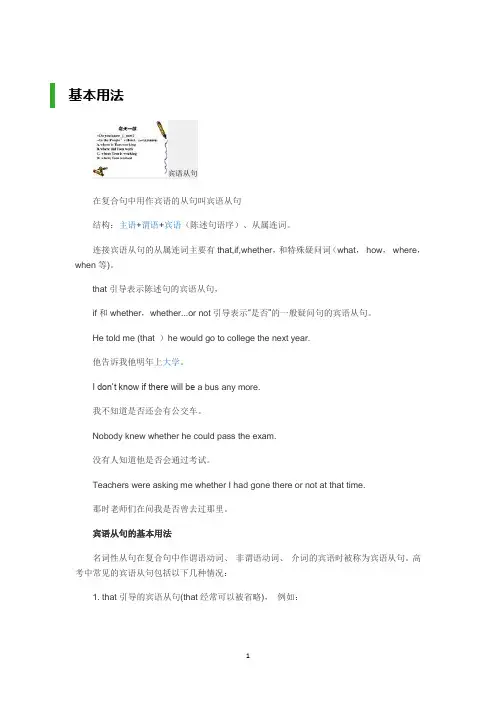
基本用法宾语从句在复合句中用作宾语的从句叫宾语从句结构:主语+谓语+宾语(陈述句语序)、从属连词。
连接宾语从句的从属连词主要有that,if,whether,和特殊疑问词(what,how,where,when等)。
that引导表示陈述句的宾语从句,if和whether,whether...or not引导表示“是否”的一般疑问句的宾语从句。
He told me (that )he would go to college the next year.他告诉我他明年上大学。
I don’t know if there will be a bus any more.我不知道是否还会有公交车。
Nobody knew whether he could pass the exam.没有人知道他是否会通过考试。
Teachers were asking me whether I had gone there or not at that time.那时老师们在问我是否曾去过那里。
宾语从句的基本用法名词性从句在复合句中作谓语动词、非谓语动词、介词的宾语时被称为宾语从句。
高考中常见的宾语从句包括以下几种情况:1. that引导的宾语从句(that经常可以被省略),例如:His mother said (that) Saul Grant was a music critic. 他母亲说索尔•格兰特是个音乐评论家。
把握that引导的宾语从句要注意以下特殊情况:(1) 宾语从句(通常是由that引导的宾语从句)常置于句末并用it作形式宾语。
例如:We think it important that Mary should tell the truth. 我们认为玛丽说出实情很重要。
// I have made i t clear that we’ll sign the contract with your company. 我已讲得很清楚:我方将与贵公司签订这个合约。
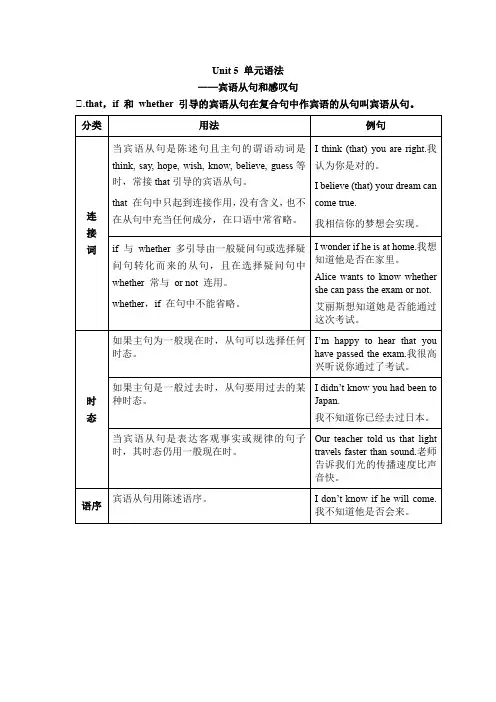
Unit 5 单元语法——宾语从句和感叹句Ⅰ.that,if 和whether 引导的宾语从句在复合句中作宾语的从句叫宾语从句。
感叹句是表示喜怒哀乐等感情的句子,感叹句用感叹号“!”,句子读时用降调。
例:What a clean room! 多么干净的房间啊!How fast he runs! 他跑得多快啊!1.what 引导的感叹句➢What+a/an+形容词+可数名词单数(+主语十谓语)!例:What a cold day!多么冷的一天啊!➢What+形容词+可数名词复数(+主语+谓语)!例:What clever monkeys! 多么聪明的猴子啊!➢What+形容词+不可数名词(+主语+谓语)!例:What cold weather it is!多么寒冷的天气啊!What important news it is!多么重要的新闻啊!2.how 引导的感叹句✓How+形容词/副词+主语+谓语!例:How clever the boy is! 这个男孩是多么聪明啊!How carefully she writes! 她写得多么认真啊!✓How+形容词+a/an+可数名词单数(+主语+谓语)!例:How cold a day it is! 多么冷的一天啊!✓How十主语十谓语!例:How I miss my mother! 我是多么想念我的母亲啊!3.在口语中,表示强烈的语气时,常常省略感叹句中的主语和谓语,有时只用一个单词或短语,有时还省略感叹句中的副词和形容词。
例:What a clever boy! 多么聪明的男孩啊!How tall! 真高!How they worked! 他们干得多起劲!Wonderful! 妙极了!Ⅰ.单项选择1.--I wonder .--I’m not sure, but I hope so. It has been dry for two months.A.if it will rain tomorrowB.why it doesn’t rainC.when the rain will stopD.how long the rain will last2.Look at the blue sky. fine weather it is!A.HowB.How aC.WhatD.What a3.-- hard-working boy Zhou Bin is! --Yes. I’m sure he’ll pass the test.A.What aB.WhatC.HowD.How a4.--Let’s go climbing if it this Saturday.--Good idea. But nobody knows if it .A.is fine;rainsB.is fine;will rainC.will be fine;rainsD.will be fine;will rain5.--Bill, what did the teacher say to you? --She asked me .A.how would I solve the problemB.whether I was ready for the taskC.why I look excitedD.what time did I get home6.--What did Betty say to you a moment ago, Jim?--She wanted to know .A.what will my family do this weekendB.who did I play the piano with just nowC.why I am late for the class meetingD.if I could go shopping with her this evening7.--It’s reported that 5G network will let people download and upload faster than before.--What amazing news!A.aB.theC.anD./8.--Wow! clean air we have today!--Yes. Look! A lot of adults are doing kungfu over there.A.HowB.What aC.How aD.What9.--You came back from Bejing yesterday. Could you tell me ?--I went there by train.A.how you went thereB.who you went withC.what you think of the tripD.if you enjoy the trip10.John told his little daughter the earth from the west to the east.A.movedB.movingC.movesD.move11.--Mom, I wonder we can travel abroad.--Maybe after the exam, baby.A.thatB.whatC.howD.when12.--I’m so sorry about yesterday.--Don’t worry about it. It’s never just one person’s fault. We should think about better next time.A.how can we do itB.how we can do itC.how can they do itD.how they can do it13.--Have you seen the movie Amazing China?--Yes. an exciting one!A.WhatB.HowC.WhenD.Why14.--Mom, I bought us two tickets to the 2018 World Cup in Russia.--Really? pleasant surprise!A.HowB.WhatC.What aD.How aⅠ.语法填空My pen pal Mike talked with me on WeChat last night. He told me 1. he just finished watching the Chinese Dragon Boat races. He said excitedly, “2. a wonderful race! How 3. (interest) it was!” He asked if I 4. (watch) the game, too. I said I didn’t. Then he asked whether we 5. (will) have the Dragon Boat Festival again next year. I told him we had it every year. He wondered if he 6. (can) come to China and 7. (join) in the races. I told him there 8. (be) always a race in my hometown on that day and he could come and 9. (take) part in it. At last, Mike wanted to know 10. we would have zongzi on that day or not. I said, “Of course!” Then we both smiled happily.。
宾语从句在复合句中用作宾语的从句叫做宾语从句。
它在句中可以充当及物动词、介词或形容词的并与。
宾语从句的三大考点即:引导词、时态和语序。
一、宾语从句的引导词1.that引导的宾语从句当宾语从句是陈述句时,用连接词that引导,that在口语、非正式文体中常被省略。
He says(that) he has been to Shanghai twice.他说他去过上海两次。
She said (that) she went to the park last week.她说她上周去公园了。
2. 特殊疑问词引导的宾语从句当宾语从句是特殊疑问句时,特殊疑问词就是引导词。
特殊疑问词引导的宾语从句疑问词不可省略。
Could you please tell me where we will have a meeting?你能告诉我们将在哪儿开会吗?I wondered what I should do next.我想知道下一步该做什么。
3. if或whether引导的宾语从句(1)当宾语从句由一般疑问句变来时,要用if或whether引导,意为“是否”。
If和whether 只起到连接作用,不充当句子成分,一般情况下可互换,但if常用于口语中,whether 常用于正式文体中。
I want to know if /whether he is waiting for me.我想知道他是否在等我。
Could you tell me if /whether you have been to Australia? 你能告诉我你是否去过澳大利亚吗?(2)下列情况下一般只能用whether:①与or not连用时I don’t know whether he likes the movie or not. 我不知道他喜不喜欢这部电影。
②作介词的宾语时Everything depends on whether we have enough time.一切取决于我们是否有足够的时间。
初三英语语法及专项训练(宾语从句、定语从句部分)[Grammar] Object Clause 总结基本概念:在复合句中用作宾语的从句叫做宾语从句。
它是众多从句中的一员,宾语从句可以作及物动词_________ 的宾语,作短语动词的宾语,介词的宾语。
I think (that) you will like the students.I am in terested in what she is doing.They often worry about whether they can get the jobs.基本特点:一、选择合适的连结词。
1. 词that (在口语、非正式文体中可以省略,本身没有意义)。
引导陈述句做宾语从句。
如:I tell him that I have read the story.2. 连词if或whether (是否);引导一般疑问句做宾语从句。
Do you know if he will go to school tomorrow?3. 代词who (作主语)、whom(作宾语)、whose (定语)、which (主语、定语);连接副词when, why, how, where,(均作状语)。
引导特殊疑问句做宾语从句。
He did n't know when he would leave for Shan ghai.*否定的用法有些表示思想和感情的动词之后的宾语从句中的否定式可以注意到这些动词之前。
I don't think you're right. = I think you aren't right.二.宾语从句要用陈述句语序。
所谓陈述句语序就是指宾语从句中主语一定要放在谓语动词之前。
(1) ................................................................................................. 主句(主语+谓语vt ) + ( that )从句(主语+谓语);⑵主句+ if/whether 从句(主语+谓语…);⑶主句+连接代词who/whom/whose/what/which+ 陈述句语序(主语+谓语…);(4 )主句+连接副词when/where/why/how+陈述句语序。
宾语从句全解在复合句中起宾语作用的从句称为宾语从句。
宾语从句是复合句的一种,由主句和从句构成,通常主句在前面,从句在后面,由连接词连接。
一、宾语从句的类型宾语从句有三种类型:以从属连词that引导的宾语从句;以wh-疑问词(疑问代词和疑问副词)引导的宾语从句;以从属连词whether或if引导的宾语从句。
二、宾语从句的特点1. 宾语从句可以作及物动词、介词及形容词的宾语。
2. 宾语从句的语序用陈述语序。
3. 连接词that在宾语从句中无词意,不充当句中成分,只起连接作用,多数情况下可以省略。
4. whether和if 都可以引导宾语从句,但whether后可紧跟or not,whether 引导的从句可作介词的宾语。
5. 如果从句太长,可以用形式宾语it来代替,真正宾语位于后面,以避免头重脚轻。
三、宾语从句的引导词引导词引导词的作用例句that 本身无词意,只起连接作用,口语中可省略。
I know (that) he is doing his best, but he says(that) he is a little weak in Chinese.if/whether 意为“是否”,不作句子成分,但不能省略。
Let's see if/whether we can find out someinformation about that city.what, who, whom, whose, which, whatever, whoever, whichever,等连接代词在从句中充当句子成分,有实际词义,通常作主语,宾语,表语和定语等,不能省略。
The teacher told us whose spoken English wasthe best in our class.when, where, how, why, whenever, wherever, however等连接副词在从句中作状语,不可省略。
I know that宾语从句的语法和语用分析一、什么是宾语从句宾语从句是名词性从句的一种,指在复合句中充当宾语的从句。
宾语从句可以作为及物动词、介词或形容词的宾语,位于它们的后面。
宾语从句的语序必须是陈述句语序,即连接词+主语+谓语+其他。
宾语从句的连接词有以下几种:从属连词,如that, if, whether等,不在从句中充当任何成分,有时可以省略。
连接代词,如who, whom, whose, what, which, whoever, whatever, whichever等,在从句中充当主语、宾语、定语等成分,不可省略。
连接副词,如when, where, why, how, whenever, wherever, however等,在从句中充当状语,不可省略。
二、I know that宾语从句的结构I know that宾语从句是由主句I know和从句that宾语从句构成的复合句。
主句的谓语动词know是一个及物动词,需要一个宾语来补充其意义。
从句that宾语从句就是主句的宾语,由从属连词that引导,后面跟一个简单句。
从句的语序是陈述句语序,即that+主语+谓语+其他。
主句和从句之间是逻辑上的主谓关系,即主语I对从句内容的知道或了解。
从句的连接词that在句中没有词义,也不充当任何成分,因此在口语或非正式文体中可以省略。
例如:I know (that) he is a good teacher. 我知道他是一个好老师。
I know (that) she likes reading. 我知道她喜欢阅读。
三、I know that宾语从句的意义和功能I know that宾语从句的意义是表示主语对从句内容的知道或了解,即主语具有某种认知或判断。
这种认知或判断可以是主观的或客观的,可以是事实的或推测的,可以是确定的或不确定的。
I know that宾语从句的功能是用来表达主语的心理状态、观点、态度、感受等,也可以用来传递或询问信息、事实、原因、结果等。
在复合句中用作宾语的从句叫宾语从句。
1.语序无论主句是陈述句还是疑问句,宾语从句都必须使用陈述语序,即“主句+连词+宾语从句(主语+谓语+……)”句式。
根据连接词在从句中所担任的不同成分,可分为以下四种:1)连接词+谓语。
连接词在从句中作主语。
常见的连接词有: who,what,which等。
如:Could you tell me who knows the answer,please?你能告诉我谁知道答案吗?The small children don't know what is in their stockings.这些小孩子不知道袜子里有什么东西?2)连接词+名词+谓语。
连接词在从句中作主语的定语。
常见的连接词有:whose,w hat,which,how many,how much等。
如:He asked whose handwriting was the best in our class.他问我们班上谁的书法最好。
The teacher asked us how many people there were in the room.老师问我们房间里有多少人。
3)连接词+主语+谓语。
连接词在从句中作宾语、状语或表语。
常见的连接词有:wh o(m),what,which,how many,how much, when,why,how,where,if /whether(在句中不充当任何成分)等。
如:He hasn't decided if he'll go on a trip to Wuxi.他还没决定是否去无锡旅行。
Could you tell me what I should do with the money ?你能告诉我我如何处理这笔钱吗?4)连接词+名词+主语+谓语。
连接词在从句中作宾语或表语的定语。
常见的连接词有:what,which,how many,how much,how等。
在复合句中用作宾语的从句叫宾语从句。
1.语序无论主句是陈述句还是疑问句,宾语从句都必须使用陈述语序,即“主句+连词+宾语从句(主语+谓语+……)”句式。
根据连接词在从句中所担任的不同成分,可分为以下四种:1)连接词+谓语。
连接词在从句中作主语。
常见的连接词有:who,what,which等。
如:Could you tell me who knows the answer,please?你能告诉我谁知道答案吗?The small children don't know what is in their stockings.这些小孩子不知道袜子里有什么东西?2)连接词+名词+谓语。
连接词在从句中作主语的定语。
常见的连接词有:whose,what,which,how many,how much等。
如:He asked whose handwriting was the best in our class.他问我们班上谁的书法最好。
The teacher asked us how many people there were in the room.老师问我们房间里有多少人。
3)连接词+主语+谓语。
连接词在从句中作宾语、状语或表语。
常见的连接词有:who(m),what,which,how many,how much,when,why,how,where,if /whether(在句中不充当任何成分)等。
如:He hasn't decided if he'll go on a trip to Wuxi.他还没决定是否去无锡旅行。
Could you tell me what I should do with the money ?你能告诉我我如何处理这笔钱吗?4)连接词+名词+主语+谓语。
连接词在从句中作宾语或表语的定语。
常见的连接词有:what,which,how many,how much,how等。
如:Do you know which class he is in ?你知道他在哪个班吗?She asked me if I knew whose pen it was.她问我是否知道这是谁的钢笔。
2.连接词1)当由陈述句充当宾语从句时,用that引导,that无词义,在口语或非正式文体中常省略。
如:He said that he could finish his work before supper.他说他会在晚饭前完成工作。
2)当由一般疑问句充当宾语从句时,用if或whether引导,意为“是否”。
如:I don't know if /whether he still lives here after so many years.我不知道这么多年后他是否还住在这儿。
但在下列情况下只能用whether:①在具有选择意义,又有or或or not时,尤其是直接与or not连用时,往往用whether(if…or not也可以使用)。
如:Let me know whether /if he will come or not.(=Let me know whether or not he will come)让我知道他是否能来。
I don't know whether /if he does any washing or not.(=I don't know whether or not he does any washing.)我不知道他洗不洗衣服。
I wonder whether we stay or whether wego.我不知道我们是去还是留。
②在介词之后用whether。
如:I'm interested in whether he likes English.我关心的是他是否喜欢英语。
We're thinking about whether we can finish the work on time.我们正在考虑是否能按时完成这项工作。
I worry about whether I hurt her feelings.我担心是否伤了她的感情。
③在不定式前用whether。
如:He hasn't decided whether to visit the old man.他尚未决定是否拜访那位老人。
I don't know whether to go.我不知去否。
He hasn't decided whether to go by bus or by train.他还未决定是乘公共汽车去还是坐火车去。
④whether置于句首时,不能换用if。
如:Whether this is true or not,I can't say.这是否真的我说不上来。
⑤引导主语从句和表语从句时宜用whether。
如:Whether she will come or not is still a question.她是否能来还是个问题。
The question is whether we can catch the bus.问题是我们能否赶上公共汽车。
⑥若用if会引起歧义时,则用whether。
如:Please let me know if you like the book.可理解为:a.Please let me know whether you like the book.请告诉我你是否喜欢这本书。
b.If you like the book,please let me know.你如果喜欢这本书,请告诉我。
3)如果宾语从句原来是特殊疑问句,只需用原来的特殊疑问词引导。
如:Could you tell me why you were late for the meeting this morning?你能告诉我今天早上你为什么开会迟到吗?3.时态含宾语从句的复合句,主、从句谓语动词的时态呼应应包括以下三点内容:1)如果主句的谓语动词是一般现在时,从句的谓语动词可根据需要,选用相应的任何时态。
如:I don't know when he will come back.我不知道他将何时回来。
He tells me that his sister came back yesterday.他告诉我他姐姐昨天回来了。
2)如果主句的谓语动词是过去时,宾语从句的谓语动词只可根据需要,选用过去时态即一般过去时、过去进行时、过去将来时或过去完成时的某一种形式。
如:①The children didn't know who he was.孩子们不知道他是谁。
②He asked his father how it happened.他问他父亲这件事是如何发生的。
3)如果宾语从句所表示的是客观事实、普遍真理、自然现象或习惯性动作等,不管主句用什么时态,从句时态都用一般现在时。
如:The teacher said that the earth goes round the sun.老师说地球绕着太阳转。
4.注意:if和when既可以引导宾语从句,也可以引导状语从句,应注意它们在两种从句中的意思和用法的不同。
if和when引导宾语从句时,分别意为“是否”和“何时”,其时态应和主句时态相呼应;它们引导状语从句时,意思分别为“如果,假如”和“当……时候”,当主句时态是一般将来时时,其时态用一般现在时。
它们常常放在含有状语从句和宾语从句的题干中进行综合考查。
如:—Do you know when he will come back tomorrow ?你知道他明天什么时候回来吗?—Sorry,I don't know.When he comes back,I'll tell you.对不起,不知道。
当他回来了,我将告诉你。
—I don't know if he will come.我不知道他是否会来。
—He will come if it doesn't rain.如果不下雨,他会来的。
简化宾语从句常用六法同学们常会遇到把含有宾语从句的复合句转化为简单句,使其与原句意思相同(或相近)的试题。
下面就介绍几种常用的简化宾语从句的方法:方法一:当主句谓语动词是hope,decide,wish,choose,agree,promise等,且宾语从句的主语与主句主语一致时,宾语从句可简化为不定式结构。
例如:Li Ming hopes he will be back very soon. →Li Ming hopes to be back very soon.We decided that we would help him. →We decided to help him.方法二:当主句谓语动词是know,learn,remember,forget,tell等动词,且主句主语与从句主语一致时,宾语从句可简化为“疑问词+不定式”结构。
例如:She has forgotten how she can open the window. →She has forgotten how to open the window.注:当主句谓语动词是tell,ask,show,teach等动词,且后带双宾语,从句主语和间接宾语一致时,宾语从句可简化为“疑问词+不定式”结构。
例如:Could you tell me how I can get to the station?→Could you tell me how to get to the station?方法三:当主句的谓语动词是order(命令),require(需要)等时,如果主句和从句的主语不一致,宾语从句可简化为“名词(代词)+不定式”结构。
例如:The headmaster ordered that we should start at once. →The headmaster ordered us to start at once.方法四:某些动词后的宾语从句,可以用介词加动名词(短语)等其他形式简化。
例如:He insisted that he should go with us. →He insisted on going with us.The poor boy doesn’t know when and where he was born. →The poor boy doesn’t know the time and the place of his birth.方法五:某些动词后面的宾语从句可转化为“宾语+V-ing形式(作宾语补足语)”结构。